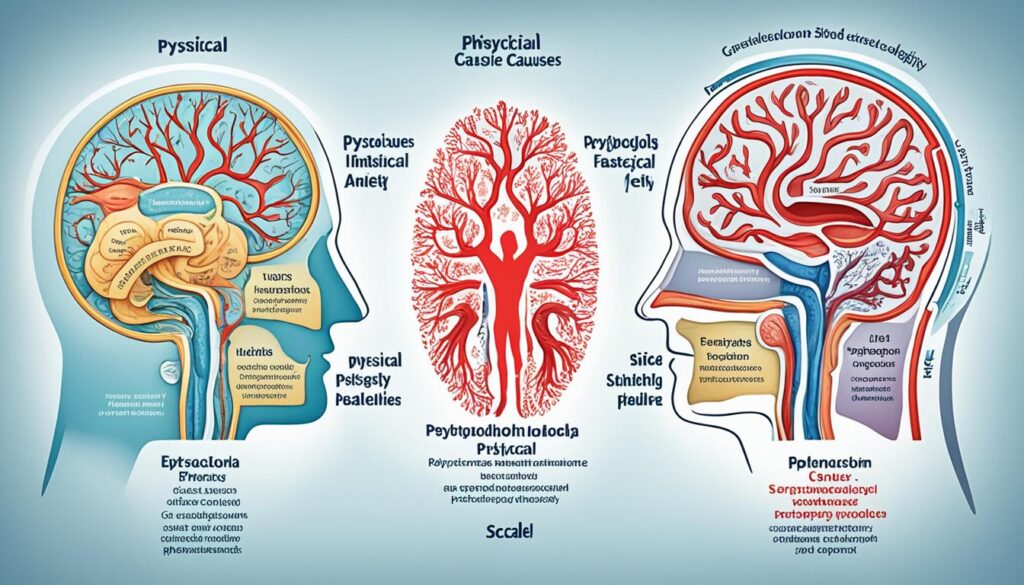Did you know that approximately 30 million men in the United States are affected by erectile dysfunction (ED)? It’s a common and often frustrating condition that can have a significant impact on a man’s self-esteem and intimate relationships. There are many misconceptions surrounding ED, including the belief that masturbation can cause this condition. However, the reality is quite different.
In this article, we will explore the relationship between masturbation and ED and debunk some of the myths associated with this topic. We’ll discuss the effects of masturbation on erectile function, the role of masturbation in treating ED, and how it can be used in conjunction with other ED treatments. By the end, you’ll have a clearer understanding of how masturbation fits into the overall picture of erectile health and what steps you can take if you are experiencing ED.
The Effects of Masturbation on Erectile Dysfunction
Research has shown that there is no direct connection between masturbation and the development of erectile dysfunction (ED). Masturbation is a normal and healthy sexual activity that can have positive effects on sexual health.
When it comes to the impact of masturbation on ED, there are a few important points to consider. First, masturbation can help release tension and reduce stress, which are known contributors to sexual difficulties. By indulging in self-pleasure, individuals can experience a release of endorphins and relaxation, potentially alleviating stress-related factors that may contribute to ED.
Furthermore, masturbation can also have a positive impact on sleep. A good night’s sleep is essential for overall sexual health, as it allows the body to restore and rejuvenate itself. Masturbation’s ability to promote relaxation and release endorphins can help individuals achieve a more restful sleep, potentially enhancing their sexual function.
However, it is important to note that excessive masturbation can potentially lead to sexual exhaustion. Engaging in excessive or compulsive masturbation without adequate rest and recovery time may cause temporary difficulties in achieving an erection. This is often referred to as the male refractory period and is a normal physiological response. It is not to be confused with ED, which is characterized by consistent difficulties in achieving or maintaining an erection.
To maintain a balanced approach to sexual activity, it is recommended to be mindful of one’s masturbation habits. If persistent or recurring issues with ED occur, seeking professional help and guidance is crucial. A healthcare provider or a specialist in sexual health can provide a proper diagnosis and recommend appropriate treatment options tailored to the individual’s needs.
Remember, sexual health is a multifaceted aspect of overall well-being. While masturbation can be a pleasurable and healthy part of one’s sexual repertoire, it is essential to prioritize open communication and seek help if any concerns or issues arise. By taking a proactive approach to sexual health, individuals can optimize their well-being and enjoy satisfying sexual experiences.
Masturbation Frequency and Erectile Dysfunction
When it comes to the frequency of masturbation and its connection to erectile dysfunction (ED), there is no definitive evidence to suggest that masturbation itself directly contributes to the development of ED. The impact of masturbation on erectile function can vary from person to person, and it’s important to understand the nuances between the two.
Firstly, it’s essential to differentiate between temporary difficulties in achieving an erection and ED. The male refractory period, which refers to the time after ejaculation when it becomes challenging to achieve another erection, is a normal physiological response for many men. Experiencing temporary difficulties in achieving an erection soon after masturbating does not necessarily indicate ED.
However, if you have concerns about ED or notice persistent or recurring difficulties in achieving or maintaining an erection, it is advisable to seek medical advice. A healthcare professional can help you determine the underlying cause of the issue and provide appropriate guidance.
Here is a more detailed breakdown:
The Male Refractory Period
The male refractory period is a normal phase after ejaculation. During this time, the body needs a period of recovery before it can achieve another erection. The duration can vary greatly among individuals and may increase with age.
Maintaining a Healthy Approach
It’s important to maintain a healthy approach to masturbation and sexual activity. While masturbation is a natural and pleasurable part of human sexuality, excessive or compulsive behavior may potentially interfere with sexual function. Striking a balance with your sexual habits and being aware of any negative impact on your overall well-being is key.
Partnered Sex and Masturbation
Many individuals engage in both partnered sex and masturbation, and both can be healthy expressions of sexual desire. If you are experiencing challenges with achieving or maintaining an erection during partnered sex, it does not necessarily mean that masturbation is the cause. Discussing these concerns openly and honestly with your partner and healthcare provider can help discern the underlying factors.
Masturbation, like any other sexual activity, should be approached with respect for one’s own body and overall sexual health. If you have concerns about ED or any other aspects of your sexual health, seeking medical advice from a qualified healthcare professional is essential for a proper diagnosis and appropriate treatment options.
Masturbation and Psychological Factors
Masturbation can play a significant role in treating erectile dysfunction (ED) caused by psychological factors such as stress, anxiety, or performance anxiety. Engaging in sexual activity, including masturbation, can have a positive impact on your confidence level and help reduce performance-related stress.
Masturbation acts as a natural stress relief, allowing you to release tension and relax both physically and mentally. It can also promote better sleep, which is crucial for overall well-being. By incorporating masturbation into your routine, you can effectively manage the psychological factors that contribute to ED.
In some cases, counseling or sex therapy may be recommended as a part of treatment for ED caused by psychological issues. These therapeutic approaches often incorporate the use of masturbation. When guided by a professional, masturbation can be a useful tool to help individuals address underlying emotional factors and develop healthier coping mechanisms for managing sexual performance concerns.
Note: While masturbation can be helpful in treating ED caused by stress or anxiety, it is important to consult a healthcare professional for a comprehensive evaluation and personalized treatment plan. They can provide guidance on the most appropriate strategies to address your specific needs.
Benefits of Masturbation in Treating ED Caused by Psychological Factors
Masturbation offers several benefits for individuals dealing with ED caused by psychological factors:
- Reduces stress and anxiety: Masturbation helps release endorphins, which can alleviate stress and anxiety, leading to a more relaxed state of mind.
- Boosts confidence: By engaging in a pleasurable sexual activity like masturbation, you can develop a sense of confidence and reassurance in your sexual abilities.
- Improves body awareness: Masturbation allows you to explore your own body and understand your sexual responses better. This self-awareness can aid in overcoming performance-related concerns.
- Enhances intimate connections: By incorporating masturbation into therapy or shared sexual experiences with your partner, you can strengthen the emotional bond and improve the overall quality of intimate relationships.
Masturbation and Mental Well-being
It is important to recognize that sexual concerns and performance anxiety can have a significant impact on mental well-being. Masturbation, when done in a healthy and balanced manner, can provide a safe and pleasurable outlet for sexual expression. By embracing self-pleasure as a part of holistic sexual health, you can prioritize your mental well-being and enhance overall sexual satisfaction.
If you are experiencing difficulties with ED related to psychological factors, exploring the role of masturbation in conjunction with professional guidance can be a valuable part of your treatment journey.
Masturbation and Other ED Treatments

Masturbation can be used in conjunction with other ED treatments to improve sexual function. Therapists may suggest incorporating masturbation or other forms of touching into therapy sessions to help individuals explore their own sexual responses and become more comfortable with sexual activity. By integrating masturbation into therapy, individuals can gain a better understanding of their body and enhance their ability to achieve and maintain an erection.
Other ED treatments, such as medications, vacuum erection devices, and penile implants, can also play a significant role in improving sexual function. Medications like Viagra, Cialis, and Levitra have been proven effective in helping individuals achieve and sustain erections. Vacuum erection devices create a vacuum around the penis, drawing blood into it and causing an erection. Penile implants, on the other hand, involve surgically inserting inflatable or malleable rods into the penis to allow for manual control over the erection process.
When used in combination with other treatments, masturbation can provide additional benefits. Therapy, in conjunction with masturbation, can address both the physiological and psychological aspects of ED. Mental health professionals can help individuals identify underlying emotional factors that may be contributing to their ED and develop healthier coping mechanisms. Moreover, counseling and sex therapy can also explore relationship dynamics, communication skills, and intimacy issues that may impact sexual function and satisfaction.
When considering treatment options for ED, it’s crucial to consult with a healthcare professional who specializes in sexual health. They can assess your individual needs and provide personalized recommendations tailored to your specific circumstances. Remember that a comprehensive approach that combines the benefits of masturbation, therapy, and other treatment options can lead to improved sexual function and overall well-being.
Debunking Masturbation Myths
There are several common myths surrounding masturbation and its relationship to ED. It’s important to debunk these misconceptions and rely on factual information when discussing the impact of masturbation on sexual health.
Myth: Excessive masturbation can cause ED
Fact: There is no scientific evidence to support the claim that excessive masturbation causes ED. Masturbation is a normal and healthy sexual activity that does not directly lead to ED. It is more commonly caused by underlying medical conditions or psychological factors.
Myth: Watching porn can lead to ED
Fact: Research suggests that there is no direct link between watching porn and experiencing ED. While excessive consumption of porn may contribute to relationship issues or unrealistic expectations, it does not directly cause ED.
Misinformation can lead to unnecessary concerns and anxiety. It is important to seek reliable sources and consult with healthcare professionals for accurate information about sexual health and the causes of ED.
Debunking Common Misconceptions About Masturbation
- Myth: Masturbation causes infertility. Fact: Masturbation does not cause infertility in men or women. Infertility is typically caused by medical conditions or specific factors that affect reproductive functions.
- Myth: Masturbation leads to weak erections. Fact: Masturbation does not weaken or damage erections. In fact, healthy sexual activity can improve overall sexual function.
- Myth: Masturbation is only for singles. Fact: Masturbation is a normal sexual activity enjoyed by individuals in various relationship statuses. It can be a healthy part of partnered or solo sexual experiences.
By debunking these myths and misconceptions, we can foster a better understanding of masturbation and its impact on sexual health. Remember, open communication with healthcare professionals is crucial for addressing any concerns or questions about ED and sexual well-being.
Causes of Erectile Dysfunction

Understanding the causes of erectile dysfunction (ED) is crucial in developing an effective treatment plan. ED can be caused by a combination of physical and psychological factors. Identifying the underlying cause is essential for optimal management and successful recovery.
Physical Causes of ED
Erectile dysfunction can result from various physical conditions that affect blood flow or nerve function in the body. Some common physical causes of ED include:
- Diabetes
- Heart disease
- High blood pressure
- Obesity
- Neurological disorders
These conditions can impair the normal functioning of the blood vessels, nerves, or hormones involved in the erectile response, leading to difficulties in achieving or maintaining an erection.
Psychological Causes of ED
Psychological factors can also contribute to erectile dysfunction. Stress, anxiety, depression, and relationship problems are some of the common psychological causes of ED. These factors can affect the brain’s signals and emotional well-being, leading to performance anxiety or diminished sexual desire.
It’s important to note that physical and psychological causes of ED can often coexist or compound each other, creating a complex interplay of factors. Therefore, a comprehensive evaluation is necessary to determine the underlying cause(s) and develop an appropriate treatment approach.
Risk Factors for ED
While ED can affect men of all ages, certain factors can increase the risk of developing the condition. These risk factors include:
- Age: The prevalence of ED increases with age.
- Smoking: Tobacco use can damage blood vessels and restrict blood flow, contributing to ED.
- Excessive alcohol consumption: Alcohol can impair sexual function and cause hormonal imbalances.
- Sedentary lifestyle: Lack of physical activity can contribute to obesity and cardiovascular problems, increasing the risk of ED.
Common Underlying Conditions for ED
In addition to the physical and psychological causes mentioned earlier, several common underlying conditions can contribute to the development of ED. These conditions include:
| Underlying Conditions | Description |
|---|---|
| Diabetes | A chronic condition that affects blood sugar control and can damage blood vessels and nerves. |
| Heart disease | Conditions such as atherosclerosis can restrict blood flow to the penis, leading to ED. |
| High blood pressure | Elevated blood pressure can damage blood vessels and impair circulation, affecting erectile function. |
| Obesity | Excess weight can contribute to hormonal imbalances and cardiovascular problems, increasing the risk of ED. |
| Neurological disorders | Conditions such as multiple sclerosis or Parkinson’s disease can affect nerve function and interfere with the erectile response. |
By addressing these underlying conditions through proper medical care and lifestyle modifications, individuals can improve their overall health and potentially alleviate erectile dysfunction.
Lifestyle Changes and ED Treatment
When it comes to preventing or managing erectile dysfunction (ED), making certain lifestyle changes can have a significant impact. By incorporating these changes into your daily routine, you can improve your overall sexual health and well-being.
Maintain a Healthy Lifestyle
- Maintain a healthy weight: Excess weight can contribute to ED, so it’s important to maintain a healthy weight through a balanced diet and regular exercise.
- Exercise regularly: Engaging in moderate-intensity exercise, such as brisk walking or cycling, for at least 30 minutes a day can improve blood flow and reduce the risk of ED.
- Avoid tobacco use: Smoking and tobacco use can damage blood vessels and decrease blood flow, leading to ED. Quitting smoking is a crucial step in improving your sexual health.
- Limit alcohol consumption: Excessive alcohol intake can interfere with sexual function. It’s important to drink in moderation and be mindful of your alcohol consumption.
Medication and Surgical Treatments for ED
For individuals with moderate to severe ED, medication and surgical treatments may be necessary. Prescription medications such as Viagra, Levitra, and Cialis are commonly prescribed to improve blood flow to the penis and enhance erection quality.
In some cases, surgical interventions may be recommended. This can include penile implants, which are devices surgically placed in the penis to help achieve and maintain an erection, or blood vessel surgery to improve blood flow.
Alternative Treatments for ED
In addition to lifestyle changes and medication, there are alternative treatments available for ED. These treatments can be used as standalone options or in conjunction with other therapies. Some alternative treatments include:
- Vacuum erection devices: These devices create a vacuum around the penis, drawing blood into the penis to create an erection. They can be a non-invasive and effective treatment option.
- Injections: Medications injected directly into the base or side of the penis can help achieve and maintain an erection. This treatment is often reserved for individuals who haven’t responded to other treatments.
It’s important to consult with a healthcare professional to determine the most appropriate treatment options for your individual circumstances. They can provide guidance on which treatments are best suited for you and help you make informed decisions regarding your sexual health.
Conclusion
In conclusion, there is no evidence to suggest that masturbation directly causes erectile dysfunction (ED). ED is often caused by underlying health conditions or psychological factors. While masturbation itself does not lead to ED, it can help manage ED caused by stress or anxiety. It is important to approach masturbation and sexual activity in a balanced manner and seek medical advice if persistent or recurring issues with ED arise.
With proper diagnosis and treatment, individuals can find effective solutions to enjoy a satisfying and healthy sex life. Open communication with a healthcare professional is key in addressing any concerns or questions about sexual health. Remember, you are not alone in facing ED, and there are effective treatments available to help improve your sexual function and overall well-being.
By understanding the true relationship between masturbation and ED, you can debunk the myths and misconceptions surrounding this topic. Embracing a holistic approach to sexual health, which includes maintaining a healthy lifestyle, seeking appropriate medical assistance, and addressing any underlying health conditions or psychological factors, will contribute to your overall sexual well-being and quality of life.
FAQ
Can masturbation cause erectile dysfunction (ED)?
No, masturbation does not directly cause ED. ED is usually caused by underlying health conditions or psychological factors.
What are the effects of masturbation on erectile dysfunction?
Masturbation itself does not lead to ED, but it can help with ED caused by psychological factors such as stress or anxiety.
Does the frequency of masturbation contribute to erectile dysfunction?
There is no definitive evidence to suggest that the frequency of masturbation directly causes ED. The impact of masturbation on erectile function varies from person to person.
How does masturbation relate to psychological factors in erectile dysfunction?
Masturbation can play a role in helping with ED caused by psychological issues such as stress, anxiety, or performance anxiety.
Can masturbation be used in conjunction with other ED treatments?
Yes, masturbation can be incorporated into therapy sessions and used alongside other treatments to improve sexual function and address both physiological and psychological aspects of ED.
What are some common myths about masturbation and ED?
There are myths that excessive masturbation can cause ED or that watching porn can lead to ED, but there is no scientific evidence to support these claims.
What are the causes of erectile dysfunction?
ED can be caused by physical factors such as diabetes, heart disease, obesity, or psychological factors such as stress, anxiety, or depression.
What lifestyle changes and ED treatments can help manage ED?
Maintaining a healthy lifestyle, such as exercising regularly, managing stress levels, and avoiding excessive alcohol or tobacco use, can help prevent or manage ED. Medications, surgical interventions, and alternative treatments may also be prescribed based on individual circumstances.
What is the conclusion about masturbation and ED?
Masturbation does not cause ED, but it can contribute to managing ED caused by psychological factors. It is important to seek medical advice for proper diagnosis and treatment of ED.






